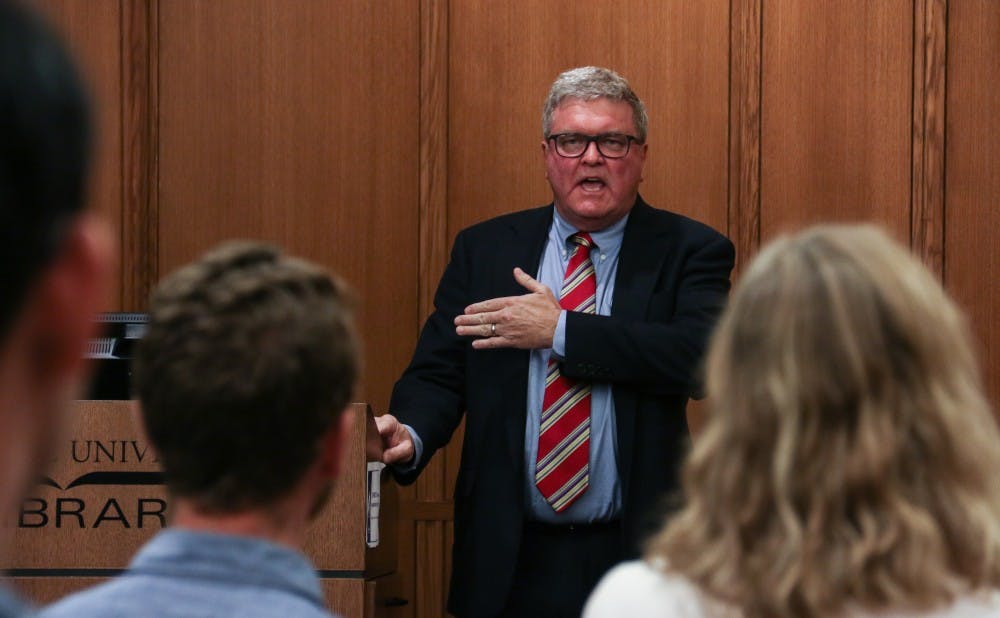Duke’s Advisory Committee on Investment Responsibility held an open forum Tuesday to discuss the ongoing debate about the University’s investment in fossil fuels.
Lawrence Baxter, chair of ACIR, explained that the question of divestment is complicated by Duke University Management Company’s goal to optimize return on investment. He is also in talks with members of the administration and DUMAC about forming a subcommittee of ACIR and Duke Climate Coalition (DCC) members that would meet with DUMAC to discuss the issue.
“[Climate change] has to be solved on a collective action basis—really by governments and parties all acting together,” he said. “And if Duke acts on its own, there is the risk that we make a hollow gesture that is perceived simply to be grandstanding while also putting a noose around DUMAC, which then has to worry about any company that might or might not have some fossil fuel involvement.”
Tracy Futhey, vice president for information technology and chief information officer at Duke, said that restricting DUMAC’s investments could harm tuition and financial aid. The challenge is to manage the “balancing act” between restricting its investments and ensuring a large return that will benefit the University, she said.
“I don’t say that to excuse making sure we have appropriate investments,” Futhey said. “The more we constrain them, the less they can return on the endowment and the more it could affect tuition or limit financial aid.”
This is not the first time the topic of fossil fuel investments has come before the committee. In 2014, ACIR recommended against divesting from fossil fuel investments. Former President Richard Brodhead and the Board of Trustees agreed with the decision, Baxter said.
The conversation's renewal comes after Duke Student Government unanimously passed a resolution encouraging the University to divest its endowment and other assets from fossil fuels by 2024. Baxter noted that the DCC also submitted a brief to ACIR to consider last fall.
Moving forward, Baxter said that he has talked with President Vincent Price about forming a subcommittee that would meet every three to four weeks until the Spring, when it would come up with a “defined course of action” related to divestment. This would be ready to present to the Board of Trustees on graduation week in May, he added.
Baxter explained that the subcommittee is not yet official, but there is no indication that DUMAC would be “hostile” toward its formation. He also said that the reservations toward divestment do not reflect ambivalence about the reality of climate change, but rather whether divesting is the best step forward.
“Scientific consensus is very strong that fossil fuels are contributing to climate change in a very negative way,” Baxter said. “The growing consensus is that these are controllable by humans and that action has to be taken trying to curb the damage that has been caused.”
This divestment issue is different from previous questions that have come before the Board of Trustees for consideration, he explained. For example, in 2008, the Board banned Duke from investing in any company with ties to Sudan, reflecting the concern over human rights violations in Darfur.
However, he added that fossil fuel divestment is more complicated because of how commonplace fossil fuels are in daily life. This ties into DUMAC’s charge to “optimize returns” in its investments, so restricting its investments would risk “putting a straitjacket” on the management company, Baxter said.
Baxter suggested that there might be more beneficial ways to address climate change aside from divesting, as other investors would buy up the assets Duke would drop in a divestment scenario.
“We’d also look somewhat hypocritical in that we’ve taken an action that most people would recognize to be the easy way out,” he said.
Investing in alternative energy is one possibility as the investments become more lucrative, he added, and encouraging the University to support solar energy are ways Duke could produce a more tangible benefit.
Senior Ethan Miller, a member of the DCC who attended the event, argued that symbolic gestures can be powerful—Duke would not alone.
In September, the Guardian reported that fossil fuel divestment funds hit $6 trillion.
“Duke acting alone does not mean that Duke is not acting in a broader framework,” Miller said.
Martin Smith, George M. Woodwell distinguished professor of environmental economics and an ACIR committee member, explained that divestments' benefits are still up in the air but taking direct action to fight climate change would have more tangible results.
“Divesting from fossil fuels may cumulatively, collectively have some effect. We don’t totally know what that effect would be—it could have an effect,” Smith said. “But weighing that against the actions that individual people or the University could take by deliberately engaging in more green initiatives on campus, those are measurable things.”
Get The Chronicle straight to your inbox
Signup for our weekly newsletter. Cancel at any time.

